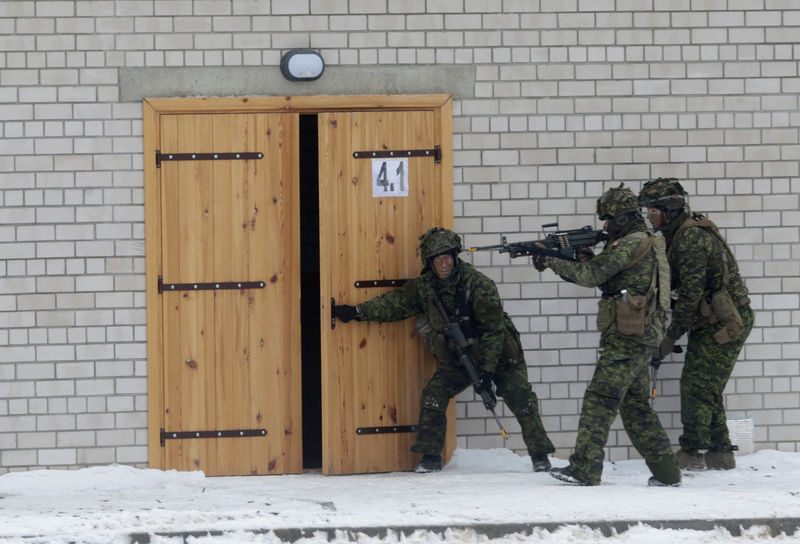By Robin Emmott and Andrius Sytas
PABRADE, Lithuania (Reuters) - Troops from 11 NATO countries including the United States rehearsed battle skills in a snowy Lithuanian forest on Friday, and the leader of the Baltic state voiced confidence that U.S. commitment to Europe's defence would survive the election of Donald Trump as president.
Trump upset U.S. allies during the election campaign by praising Russian President Vladimir Putin, describing NATO as 'obsolete' and questioning whether Washington should protect European allies who did not spend enough on their own defence.
But Lithuanian President Dalia Grybauskaite played down those comments as she inspected some of the 4,000 allied troops taking part in an exercise in a pine forest near the border with Belarus, including Canadian snipers, U.S. infantry and German soldiers with missile launchers.
"The United States has been the guarantor of peace since the Second World War and we expect that to remain," she said. "Things mentioned in (Trump's) election campaign - we are leaving them in the past."
Underlining the point, U.S. Ambassador to Lithuania Anne Hall stressed U.S. commitment to the NATO treaty clause that commits its members to each other's protection.
"This is a clear demonstration of NATO’s interoperability, its resolve and its commitment to the collective defence. And the U.S. commitment to NATO’s Article 5 is iron clad, and this exercise is a good demonstration of that," she said.
"WE HAVE TO BE READY"
In moves prompted by Russia's annexation of Crimea and its support for separatists in eastern Ukraine, NATO is deploying four battalions of up to 1,000 troops each from early next year to defend Poland and the former Soviet Baltic states of Lithuania, Latvia and Estonia.
The deployment was planned months before the election of Trump, who unnerved the central and east Europeans by suggesting the United States should set conditions for defending its allies in the North Atlantic Treaty Organisation.
Moscow says it has no intention of invading the Baltics or Poland and accuses NATO of destabilising Europe by placing U.S. missile systems in eastern Europe and moving troops closer to Russia's borders.
NATO says its response is aimed at creating a "credible deterrent", citing not only the annexation of Crimea but Russia's actions in conducting unannounced snap exercises and placing nuclear-capable missiles in its Kaliningrad region, which borders Lithuania.
A German battalion will deploy to Lithuania from February, while British, Canadian and U.S. battalions will go to Estonia, Latvia and Poland respectively. Smaller rotating contingents of U.S. troops have been deployed across the region since Russia seized Crimea from Ukraine in March 2014.
Asked if a Russian attack was possible, Lithuania's Chief of Defence Jonas Zukas told Reuters: "I hope it won't be the case, but who knows? We have to be ready every day."
"SENSE OF PURPOSE"
Just 15 km (9.3 miles) from Lithuania's frontier with Russian ally Belarus, NATO soldiers in green camouflage and face paint set off simulated explosions and fired automatic weapons to retake a mock village from an unidentified enemy, ending the last major exercises before next year's deployments.
No officials mentioned Russia by name during speeches to the visiting Lithuania president. But U.S. soldiers said training so near to NATO's eastern limits made any perceived threat more real, especially as some had never exercised in snow conditions.
"It provides a sense of purpose, having a mission," said U.S. Lieutenant Colonel Michael Kloepper.
NATO commanders concede next year's 4,000-strong force in the Baltics and Poland is no match for Russia, which NATO believes has amassed 330,000 troops near Moscow.
Russia's anti-ship and anti-missile systems in Kaliningrad already represent a major challenge for NATO planners, while Baltic nations also want stronger air defence systems.
"Every day we need more, and every day we will have more," Grybauskaite said.
German Brigadier General Michael Podzus said the goal was not to outgun Russia but to form a functioning multinational force and show that an attack against one is an attack against all, underscoring NATO's founding principle which Trump called into question during his campaign.
"You might be right that a battlegroup will not be able to fight against an army. That's not the point," Podzus said.

"If an aggressor chose to attack this country, he would have to deal with other countries as well. That may drive the aggressor to rethink his intent."